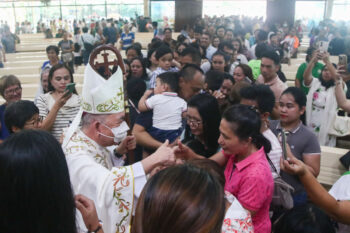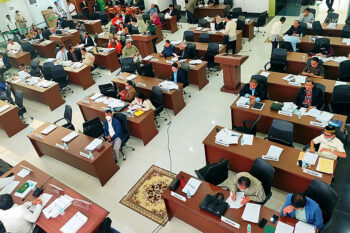BARCELONA, Spain (MindaNews/17 June) — Dealing with the past is now one of the big challenges for the Philippines in its transition from war to peace in Mindanao. Moro and mainstream narratives on the root causes and the consequences of armed conflict are still partially conflicting, and are often based on prejudice. At the same time it is clear that hundreds of thousands of innocent civilians have been displaced, wounded and killed during the war. It is therefore a welcome development that the Framework Agreement on the Bangsamoro mentions that “the Parties agree to work out a program for transitional justice to address the legitimate grievances of the Bangsamoro people, correct historical injustices, and address human rights violations.”
But what precisely are these grievances and injustices? Who committed them and why? What sort of justice is needed? And, what is the best way to deal with the past in order to strengthen coexistence and prevent further confrontation, to promote a more trusted, accountable and democratic governance system?
The four universal core pillars in the process of dealing with the past are: truth, justice, reparation and guarantees for non-recurrence. But there is no recipe on how to frame the approach, and each country makes its own choices, based on the developments during the conflict as well as the local cultural values and expectations. There is now a wealth of international examples that can inform decisions that have to be taken in the Philippines.
Truth
South Africa decided to focus on truth-telling as a way for healing the wounds and opening space for national reconciliation. With the moral authority of Archbishop Desmond Tutu, who acted as chair, a Truth and Reconciliation Commission encouraged victims to share their experiences during the apartheid regime. At the same time the Commission encouraged perpetrators to voluntarily confess their responsibilities. Those who were brave (or smart) enough to admit their wrong-doing were granted conditional amnesty. Those who decided to remain silent would be prosecuted through regular justice procedures.
A full Truth Commission has not been possible in deeply divided societies like Northern Ireland, essentially because the lack of cross-sector trust in an independent fact-finding mission. Fifteen years after the peace agreement the Catholic and the Protestant communities still lack a commonly accepted overall narrative on the roots, the consequences and, especially, the responsibilities of the years of confrontations, which is still hampering a stable peace.
The problem is even worse in Spain, where discussing responsibilities for atrocities committed during and after the Civil War (1936-1939) is still not possible today without huge political controversy. The current political tensions in Spain are partially a consequence of turning a blind eye to what happened during the war and the ensuing dictatorship.
Other countries have followed different approaches. People in Cambodia found acknowledgement of memory much more powerful for all aggrieved parties.
Justice
In many post-conflict situations justice and peace are presented as mutually excluding principles. Especially when justice is associated strictly with punishment of the perpetrators. As nobody can claim full innocence in any war, criminal justice is not really an incentive to give up fighting and return to normal life. No wonder one of the first agreements warring parties tend to reach is on amnesty, as it benefits both of them.
At the same time amnesty is not acceptable under international standards any more. The debate on marrying justice and peace has led to interesting questions such as what sort of justice are people expecting?
Latin American has a strong tradition on focusing on criminal justice. Countries like Argentina, Chile, Uruguay and Brazil have shown strong courage in filing legal cases against perpetrators of the dictatorships in the 1970s and 1980s, only a few years after their transition to democracy. These cases have triggered passionate national debates but, in the end, they have strengthened the trust in the democratic institutions, and brought hope for an inclusive future without rivalries from the past.
In Rwanda, instead, in the wake of genocide of hundreds of thousands of people, and given the absence of a strong and credible legal system, the country decided to pursue justice and reconciliation through Gacaca courts, based on traditional cultural communal law enforcement procedures. This resort to traditional systems has not been straightforward but it has been an essential step to promote coexistence.
The Rwandan case illustrates an increasing trend towards restorative justice, that is, an approach that puts more efforts in reconciling victim, perpetrator and community instead of only punishing the perpetrator. Timor Leste, Indonesia, Cambodia and other Asian conflict-affected countries have developed interesting experiences combining the formal legal system with traditional practices.
Reparation
Economic reparation to victims is hugely controversial as it is difficult to draw a line between those who can and those who cannot claim financial compensation. The Philippines has experience in the case of almost 10,000 victims who filed a class suit against Marcos in 1986, and some sort of compensation is finally ready after more than 25 years. Germany has paid huge amounts of money to victims of the Nazi regime.
Reparation can also take place though non-monetary means. Colombia approved a law to return land.to hundreds of thousands of peasants who have been forcibly displaced over the past decades.
There is also a growing trend for public apologies to provide moral compensation for victims and their descendants and to adjust the often romantic national narratives to the ugly realities of discrimination and violence. Over the past year former colonial powers, but also post-colonial governments such as Canada, New Zealand, Australia and Indonesia have apologized for abuses committed against their own people, usually the original inhabitants.
Non-repetition
Generally a peace agreement includes the measures for a permanent settlement of the armed conflict, including structural reforms to strengthen democracy and the whole process of normalisation of weapons and combat forces and the support to conflict-affected communities. In the frame of transitional justice this process may need vetting procedures to avoid that those persons responsible for human rights violations enjoy or maintain access to positions of power in the security, the governance or the economic sectors.
Questions and challenges for Mindanao
Coming back to Mindanao, Government, the Moro Islamic Liberation Front and all other stakeholders have to discuss and agree on the best way to pursue transitional justice in the frame of the peace process, starting with the essential question: what is the purpose? How much truth, justice and reparation is needed? And, more importantly, what sort of truth, of justice and of reparation would respond to the rights and needs of victims and society? How can this process respond to the atrocities and injustice committed by all sides?
Conflict cannot be simplified as a struggle between “good” and “bad” guys: besides Christian-Moro animosities there is a history of Moro and settler abuses against indigenous peoples, as well as intra-Moro, intra-settler, and intra-indigenous violence and injustices. Maybe the most important question is: what process is best suited to respond to the full diversity of local culture, traditions and expectations instead of simply importing international procedures and assumptions?
Dealing with the past is an important but thorny issue. It can help inculcate a sense of respect for the grievances and aspirations for the other and, thereby, heal wounds and promote reconciliation. At the same time it has to respond to multiple and sometimes conflicting expectations. If not handled carefully it risks having a limited impact or even to exacerbate tensions in divided societies.
As any peacebuilding initiative, the challenge therefore is to promote a process that is inclusive and responsive to the diversity of experiences of injustice, observing lessons from elsewhere but responding to local needs and realities. The process also calls for a social consensus on the importance of dealing with the past and a clear commitment for institutional action. And, above all, it calls for acting with a spirit of generosity to promote a positive cycle to heal the wounds and leave the conflict behind. (MindaViews is the opinion section of MindaNews. PeaceTalk is open to anyone who wants to share his/her views on peace in Mindanao. Kristian Herbolzheimer is Director of the Philippines programme of the Conciliation Resources, www.c-r.org)







